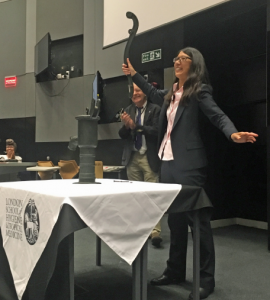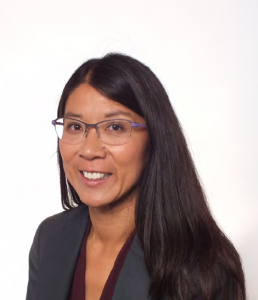The 26th Annual Pumphandle Lecture was delivered on Thursday 6thth September 2018, by Dr Joanne Liu, International President of Médecins Sans Frontiers / Doctors without Borders.
Dr Liu’s presentation described, and then drew lessons from, three recent health crises in which MSF has been prominently involved, and which have captured global attention: Ebola, the Kunduz attack, and the forced displacement crisis. She emphasised that each of these crises has involved fear at several levels, and that fear complicates motives and detracts from humanitarian ideals crucial to an appropriate health response and to society at large. Her accounts reflected her own personal involvement in each of these issues, and included moving photographic images.
The West African Ebola epidemic, which began in 2014, caught the world by surprise, being so much larger than any of the previous outbreaks of the disease. MSF set up treatment centres based upon its previous experience but these were soon overwhelmed by numbers – she described a treatment centre which could only open its doors for 30 minutes a day, just long enough to dispose of the bodies of those who died overnight and refill the beds. She spoke of the difficult messages early in the response – telling people that there was this disease, with case fatality rate above fifty percent, for which there was no treatment – of course people were afraid to go to a hospital just to die… and so they remained at home infecting others. The world woke up when a few cases were repatriated to western countries – and it soon became seen as a threat to global security. That lead to the unusual call for infrastructure assistance from military agencies. Though there was no military intervention, just the fact that MSF asked for military assets was evidence that something was deeply wrong. Among the lessons were the need to streamline research and development under epidemic conditions. Dr Liu also reflected on the irony that Ebola attracted such a level of attention, though tuberculosis, which kills so many more, is not treated with urgency by the global community.
She then turned to describe MSF involvement in Afghanistan, in particular a large trauma hospital built in Kunduz, in the north of the country. It served people of all political persuasions, and had hosted 15,000 surgical operations and 17,000 emergency visits since its construction in 2011. The hospital was bombed and largely destroyed by airstrikes by so-called coalition forces on the night of 3rd October 2015. Though the Kunduz bombing was declared to have been a mistake, Dr Liu drew a parallel with the policy of President Assad in Syria to target health facilities in areas opposing his government, declaring it a crime to bring health care to an opposing side. This is a perversion which must be challenged at every level: the doctor of your enemy is not your enemy.
Finally, she discussed the widespread crisis of forced displacement and refugees – some 68 million people in today’s world, including half the population of Syria. She described camps for displaced persons in Lesbos and in Libya as among the most shocking scenes she had witnessed in the world… associated with the desperate efforts of people to escape dreadful circumstances in their home countries, leading to every sort of abuse and too often to death by drowning in the Mediterranean Sea. This reflects fear in both directions – the understandable fear of people to remain in their homes … met by the paranoid fear of the world to which they wish flee. The outcome is a disaster for humanity.
These descriptions amply illustrated the theme in the lecture’s title: the cost of fear. Dr Liu closed by encouraging epidemiologists in the audience to collect “damning data”, to illustrate and expose the circumstances such as she had described in order to change opinions and policies.
The vote of thanks was proposed by Professor Jimmy Whitworth, and Dr Liu was invited to remove the handle of the pump to close the proceedings. Society Members then adjourned to the John Snow Pub in Soho for the Annual General Meeting of the Society.


